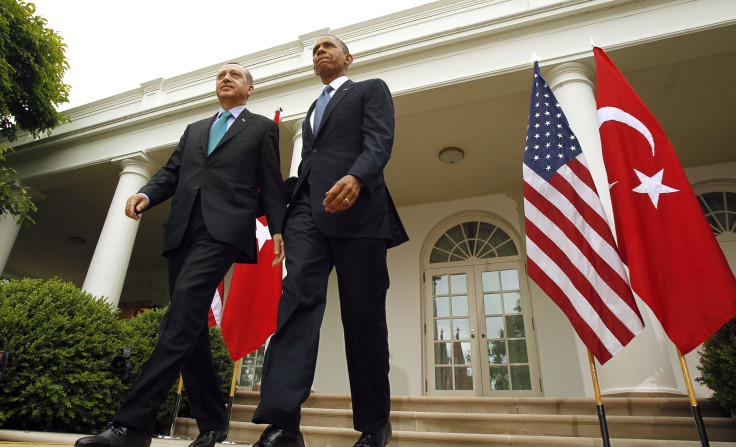Erdogan To Visit Gaza, Reaffirms With Obama Commitment to Ousting Assad

Prime Minister of Turkey Recep Tayyip Erdogan is in the U.S. on Thursday for talks with President Barack Obama on the situation in Syria. Erdogan also took a few questions on his planned trip to visit the Gaza Strip, a visit he said might take place in June.
U.S. Secretary of State John Kerry has asked Erdogan not to make the trip, to avoid further souring Turkey’s already-spoiled ties with Israel, but Erdogan said he'll visit not only Gaza but also the West Bank, and that he “place[s] a lot of significance on this visit in terms of peace in the Middle East, and this visit is in no way a means of favoring one or the other."
“I hope this will contribute to unity in Palestine,” Erdogan said in the Rose Garden under a drizzle of rain. “This is something I focus on very much. I hope my visit can contribute to this.” Erdogan didn't specify whether he meant the political unity of Hamas, the ruling party in Gaza and Fatah in the West Bank, or if he meant the physical unity of the two Palestinian territories.
The U.S. and Israel, along with the European Union, Canada, Japan, and the U.K., classify Hamas as a terrorist organization. Turkey doesn't, and met with Hamas leaders after their 2006 election, and again in 2010. At the 2010 meeting with Hamas political leader Khaled Meshaal, Erdogan called Hamas “resistance fighters who are struggling to defend their land.”
Erdogan also said that he was “working with the Israeli government for compensation” regarding the incident with the Turkish humanitarian aid ship that attempted to run the Israeli and Egyptian blockade of Gaza in May 2010, in which eight Turks and one Turkish-American were killed, and 10 Israeli commandos were wounded. On March 22, after years of bad relations, Israel officially apologized to Turkey and the two countries agreed to restore ties.
Obama said that he was committed to helping Turkey normalize relations with Israel. “This will benefit both countries, and make progress on a two state solution,” he said.
On the subject of Syria, both leaders were adamant that Syrian President Bashar al-Assad needed to go, but were light on details as to future plans they or any other major world powers might have as to how to make this happen. “The answer is the sooner the better,” Obama said. “However, there’s no magic formula for dealing with violent and difficult situation. We have to apply steady international pressure and strengthen the opposition.”
When asked about what the U.S. might do now that Obama’s declared “red line” in Syria had been crossed with the evidence that chemical weapons had been used, Obama said they were still gathering information, but remained vague on any future plans of actions. “We have seen evidence of the use of chemical weapons inside Syria,” he said. “It’s important to make sure that we get more specific information about what is happening. But separately, we know people are being killed. This is a humanitarian crisis, which by itself is sufficient to prompt strong international actions.”
Obama didn't elaborate on what that “strong international actions” should be, but added that he and Erdogan were committed to “strengthening the opposition politically,” as well as taking “steps needed to strengthen the capacity of the Syrian opposition on the ground,” and “mobilizing the entire international community so that [Assad] recognizes he is no longer legitimate and needs to go.”
On Wednesday, Erdogan visited the Turkish American Community Center in Maryland, where he stressed the importance of improving the image of Islam.
© Copyright IBTimes 2024. All rights reserved.






















